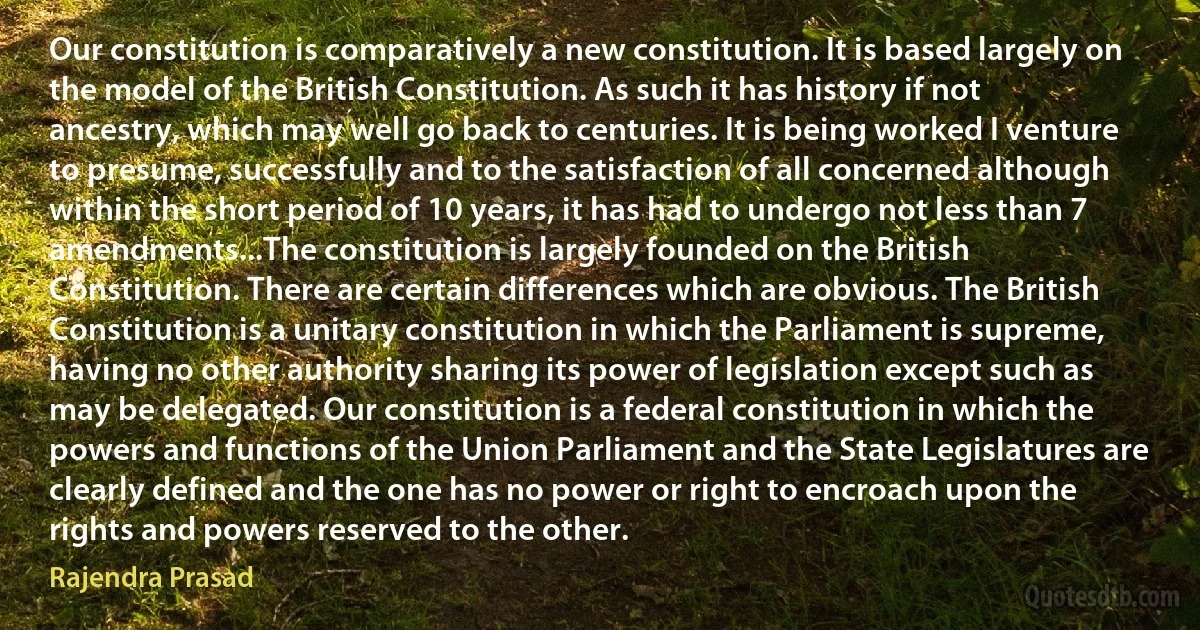
Our constitution is comparatively a new constitution. It is based largely on the model of the British Constitution. As such it has history if not ancestry, which may well go back to centuries. It is being worked I venture to presume, successfully and to the satisfaction of all concerned although within the short period of 10 years, it has had to undergo not less than 7 amendments...The constitution is largely founded on the British Constitution. There are certain differences which are obvious. The British Constitution is a unitary constitution in which the Parliament is supreme, having no other authority sharing its power of legislation except such as may be delegated. Our constitution is a federal constitution in which the powers and functions of the Union Parliament and the State Legislatures are clearly defined and the one has no power or right to encroach upon the rights and powers reserved to the other.
Rajendra PrasadRelated topics
authority certain federal having history legislation less model power right short state unitary venture well yearsRelated quotes
The issues raised in the historic conflict between Charles I, resting his claim to govern Britain on the divine right of kings, and Parliament - representing, however imperfectly, a demand for the wider sharing of power - concerned the use and abuse of state power, the right of the governed to a say in their government, and the nature of political freedom. The Levellers grew out of this conflict. They represented the aspirations of working people who suffered under the persecution of kings, landowners and the priestly class, and they spoke for those who experienced the hardships of poverty and deprivation. They developed and campaigned, first with Cromwell and then against him, for a political and constitutional settlement of the civil war which would embody principles of political freedom, anticipating by a century and a half the ideas of the American and French revolutions.

Tony Benn
England is a capitalist democracy. Germany is a socialist people's state. And it is not the case that we think England is the richest land on earth. There are lords and City men in England who are in fact the richest men on earth. The broad masses, however, see little of this wealth. We see in England an army of millions of impoverished, socially enslaved, and oppressed people. Child labor is still a matter of course there. They have only heard about social welfare programs. Parliament occasionally discusses social legislation. Nowhere else is there such terrible and horrifying inequality as in the English slums. Those with good breeding take no notice of it. Should anyone speak of it in public, the press, which serves plutocratic democracy, quickly brands him the worst kind of rascal. They do not hesitate to make major changes in the Constitution if they are necessary to preserve capitalist democracy.

Joseph Goebbels
Though the war ended forever the possibility of disunion, there still remain problems between State and Federal authority. There are divisions of interest, perhaps more apparent than real, among geographical sections or social groups. The seaboard thinks it has interests in maritime transportation and overseas commerce which differ greatly from those of the interior, which is peculiarly dependent upon railroads. Difference in climate and physical conditions throughout so great a territory tend to varied social habits and modes of living which react upon the economic and political attitudes. The industrial development of some sections contrasts with the agricultural character of others. Obviously, these differences give rise to many problems in government, which must always be recognized. But it is hardly conceivable that a really menacing contest between the sovereignty of the States and of the Union could ever again arise.

Calvin Coolidge
The quantum theory, as it is now constituted, presents us with a very great challenge, if we are at all interested in such a venture, for in quantum physics there is no consistent notion at all of what the reality may be that underlies the universal constitution and structure of matter. Thus, if we try to use the prevailing world view based on the notions of particles, we discover that the 'particles' (such as electrons) can also manifest as waves, that they move discontinuously, that there are no laws at all that apply in detail to the actual movements of individual particles and that only statistical predictions can be made about large aggregates of such particles. If on the other hand we apply the world view in which the world is regarded as a continuous field, we find that this field must also be discontinuous, as well as particle-like, and that it is as undermined in its actual behaviour as is required in the particle view of relation as a whole.

David Bohm
They knew, however, that self-government is still government, and that the authority of the Constitution and the law is still authority. They knew that a government without power is a contradiction in terms. In order that their President and their Congress might not surpass the bounds of the authority granted to them, by the Constitution which the people had made, and so infringe upon the liberties of the people, they established a third independent department of the government, with the power to interpret and declare the Constitution and the law, the inferior courts and the Supreme Court of the United States. No President, however powerful, and no majority of Congress however large, can take from an individual, no matter how humble, that freedom and those rights which are guaranteed to him by the Constitution. The Supreme Court has final authority to determine all questions arising under the Constitution and laws of the United States.

Calvin Coolidge
